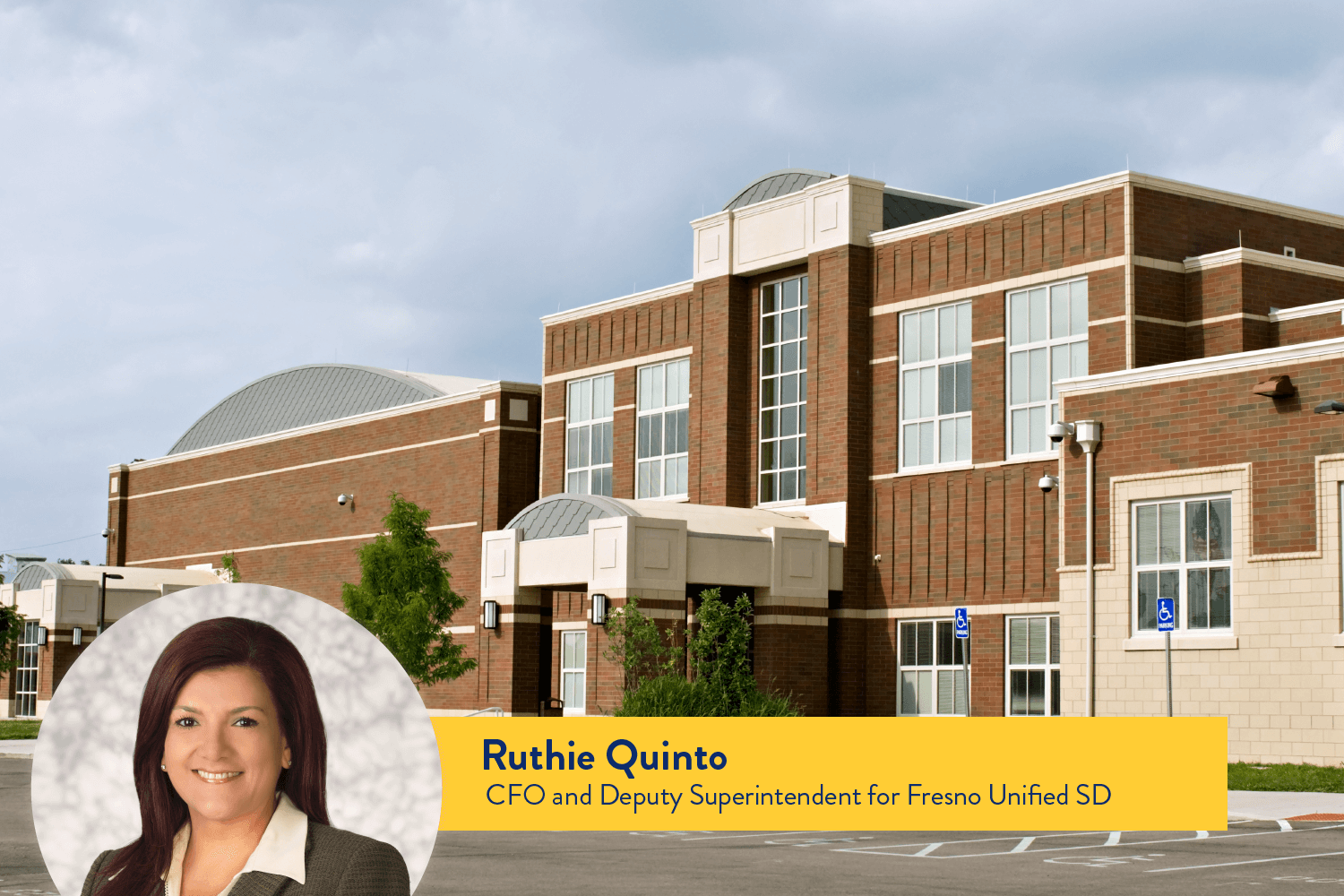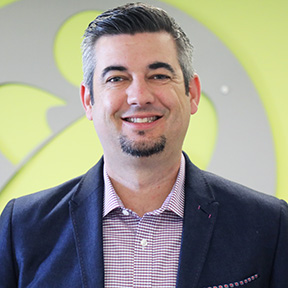
Ruthie Quinto, CFO and Deputy Superintendent, Fresno Unified School District
On this episode of The 3rd Question we talk with Ruthie Quinto – CFO and Deputy Superintendent for Fresno Unified School District, as she highlights the innovative and dramatic cost savings strategies she's brought to her district.
Video Transcript
Ryan James:
Hello and welcome to The 3rd Question, a video interview series with public sector thought leaders from around the country. My name is Ryan James. I'm your host, and today we are joined by Ruthie Quinto. Ruthie is the CFO and deputy superintendent of Fresno Unified School District here in California. Ruthie, thank you so much for joining me today.
Ruthie Quinto:
Absolutely, and very happy to be here.
Ryan James:
So before we get into the three questions, I guess I'd first ask if you could just give us a little bit about who you are and a little bit about Fresno Unified School District.
Ruthie Quinto:
You bet. So, as you said, I'm the chief financial officer and the deputy superintendent for Fresno Unified. I have been in my position for 15 years, so it's hard to believe, but so blessed to be able to contribute to the community in this way. Prior to this position, I was a city controller for the City of Fresno. I worked for Mayor Autry for about five years and very much enjoyed that as well. I'm a CPA and I worked for a public accounting firm primarily in Southern California, and worked in public accounting for eight years. Very much enjoyed that time as well, getting to learn different sectors and work with clients of all different sizes and really also to season my technical skills. I think that's served me very well working in government.
Ryan James:
Yeah. What about a little bit about the school district itself?
Ruthie Quinto:
Fresno Unified serves about 74,000 students. We are the third largest school district in the state of California. Not a lot of people know that. Yeah, we definitely have a presence in Sacramento and on the national scale, and we stay quite involved, not only with our colleagues, but also with organizations that are working on our behalf, both, again, at the state level and nationally. We have a full scope of choices for our parents. Choice programs that include magnet schools, dual immersion schools in every region of the district. We do have a very strong academic magnet from Manchester Gate to Computech to Edison, and that really is a beautiful blend of all cultures and of all students from all corners of our district.
Ryan James:
I love that. That's awesome. Well, let's get into the questions. So your first question is this. As the CFO and deputy superintendent for the school district there, obviously you are heavily involved in helping your organization work through evaluating and prioritizing a lot of what your budget is going to be going towards, not just for the schools and teachers, but also your students and education, which is obviously the primary objective. So because of what's going on right now, school districts are facing a lot of challenges with the current pandemic. How has that maybe forced you to refocus some of those fiscal priorities? And I guess I'd ask also, how would you describe that evaluation? How do you prioritize what comes to top of the pile from a budget perspective?
Ruthie Quinto:
Right. So it's a great question, and I will say that the first thing that we needed to do was ensure the health, safety and security of our students and our staff. And that means that we are constantly following, looking forward (tried to influence as well) but based on science and based on guidelines making sure that we're following what the guidelines are in order to ensure that health, safety and security of our kids and of our staff. The shutdown in the spring was so sudden and it was so unfortunate. I think that there were a lot of areas where we weren't prepared from an instructional perspective, but then I'm not sure who was.
What we did, however, was we quickly, quickly identified those priority areas, such as devices that students can have at home, connectivity issues for students that might not live in an area where cell towers are around every corner, and then also making sure that our meal service and delivery was zero stoppage. We also just extended meal service delivery to serve the adults in our community as well, knowing that that would be an additional cost to us, but just wanting to relieve that additional stressor that might come with the food insecurity that unfortunately is so prevalent in our district.
So those were really our main priority areas when we first shut down. Over the summer, we've worked continuously and we've worked so diligently to set up a distance learning platform and program that would really serve all of our students with a particular focus on our most vulnerable populations, including reaching families, connecting with families who are non-English speakers, and making connections through the school site for all of those vulnerable populations. For example, our special ed students as well as working very closely with our athletes to enter back into a safe workout schedule for over the summer. Of course we didn't know what the fall season would look like, but really just looking at the variety of our populations and addressing their needs on a very deliberate in-depth basis.
Ryan James:
Can I ask just kind of a followup to that? When you look at your budget choices prior to COVID, do you as a school district, do you rank them based on the needs, obviously the needs of the students are probably the top rank, but also things around like ROI, connectivity, how does that work for Fresno Unified?
Ruthie Quinto:
Right. Here at Fresno Unified, and it does, I think, stem from my time in the private sector and knowing the dollars and cents of billable hours and changeability and realization and those types of things that were so ingrained and prevalent in my time, in my eight years in that environment. How we evaluate now is through a set of board-adopted parameters for all aspects of resource investment and planning and prioritization. So that's on the front end, is how do we, based on the district's goals and a strategic plan, how do we make sure that we are investing in the right area so that at the end of the day the budget actually does reflect a significant fiscal policy and operational and instructional policy document? Because of course, where you invest your resources, that's the biggest tell of what your priorities are.
Ruthie Quinto:
At the same time, as we are making it through any cycle, it could be a fiscal year, but it could also be shorter than a fiscal year and sometimes it's longer, depending on what the initiative is, we are re-evaluating those investments continually. We actually do call it a cycle of continuous improvement, where we planned, we acted by providing those resources, but then we're evaluating and measuring and utilizing very specific metrics in order for us to determine the value of the relative initiative. And then we can go back and we can replan, or we can stop what we're doing when we know something's not working. That's a little bit tougher to do, as you might imagine in this environment. But it is the theory of action in how we evaluate the resources and investments that we put out.
Ryan James:
That's so interesting, because you see so often where there's this mentality of sunk cost, and we just got to keep going because we've already invested so much money, just keep pushing through, pushing through when not doing that continual assessment to go, "All right, maybe we should put the brakes on this right now and see what else is maybe a better choice."
Ruthie Quinto:
That's right.
Ryan James:
So I applaud you for that. That probably is some private sector-ism that you brought to that role. All right. Well, let me ask the second one. And I'm really interested in this, because your organization's health benefits also tree up under you, which isn't normal. I don't see that often under the CFO role. So because you oversee it for your employees, obviously right now, healthcare is kind of top of mind and have a lot of importance for your employees dealing with COVID-19 and their families. But I often hear that employee education and communication is one of the hardest aspects around benefits administration for an organization. Not to mention just the rising costs going up year over year over year and having to deal with that. You're dealing with both of these things as a CFO and overseeing benefits. What are some of the ways that your organization has tackled those two challenges, and do you have any future goals or changes in mind around how this will work for your employees' lives?
Ruthie Quinto:
I'm going to start by going back just a little bit. When I first got here in the summer of 2005, the district was bankrupt, both academically and financially. The main reason for the financial bankruptcy was the runaway increased costs of the health and welfare system. We were just coming out of a very long period of time where all health benefits were free, no cost to employees or their families, no premiums, no deductibles, no copays, no out-of-pocket at all, and that needed to change in order for there to be some stability that could be counted on when you're looking at forecasting and planning for fully funding the health and welfare system.
Ruthie Quinto:
What we did, it was a very innovative partnership that was agreed upon between the unions and the leadership, the administration, and we formed a joint health management board. That management board has full responsibility for the plan, design and implementation of all of our health and welfare plans. It gets action by one vote labor and one vote management, and I have been the management co-chair since its inception, and we've had just only three labor co-chairs in all of that time. There's a lot of consistency with the entire team. There's 25 labor leaders around the table and about five to seven management folks, and of course a host of professionals that are helping us. But what we did was we completely bent the curve. In the five years leading up to 2005, the district's health benefit costs were increasing at about the state or national average between 9 and 11% per year, year over year for those previous five years. But once we implemented the JHMB, as we call it, the joint health management board, we stopped those increases and in fact, in the 15 years that we've been in existence, our average annual increase hovers at about 3.5% per year.
Ruthie Quinto:
If you think about the exponential savings, not only just year over year, but the cumulative savings that we have been able to realize, it really is a phenomenal story and it could not have happened without the collaboration and the partnership of our union leaders, I give them all the credit, and also the vision and the confidence of the Board of Education at the time and every board since then to continue to invest and believe in this partnership. We have one of the most robust and complete health and welfare benefit plans on the Valley floor, and we continue to work tirelessly, actually, in order to make sure to maintain that, as well.
Ryan James:
I have a feeling people that watch this might be reaching out to you, so be warned, because I think just being able to have the data to say, "Look, we've had this average that's half, if not a third of, or 60% less than what the national average has been seeing over year over year." You're right. It's exponential in a lot of ways, the savings.
Ruthie Quinto:
It really is. And speaking of data, that's one of the things that we implemented as a group, or very early on, was requiring our health plan consultant to be a data integrator so that information from all the vendors are utilized, not just medical and prescription, but dental, vision, chiropractic, all of them. All of that data is consolidated and we look at 12 months of activity every month over the past three years. So these 12 months, and then the 12 months from the previous year. We look at that every single month. It's about a three-page report that is in a dashboard format where we have something that pops or something that's green. So it could be green or gray or red, but that data is driving our agenda. That is driving our work, what do we need to address? Is it cervical cancer screenings, is it breast cancer screenings? Are people over 50 going for their required tests? Are we doing the right things and how can we get the word out that these are the wellness steps that you need to take in order to not just benefit our bottom line, but actually to give you a better quality of life. That really is the key. We've had that data dashboard in place and refining it here and there for the better part of 10 years.
Ryan James:
I love it. I love it. I love when I hear forward-thinking organizations in the public sector, because you guys... I don't like saying they're few and far between, but I've had the opportunity to talk and work with public sector organizations for over a decade now, and they tend to lag in forward thinking, so it's a testament to what you've done.
Ruthie Quinto:
Thank you.
Ryan James:
All right, well we are at the third question, so quickly, and today I am going to pick, back here I've got some time machines on my shift and I'm going to pick the DeLorean that we all love from Back to the Future. So Ruthie, if I gave you the DeLorean and you could go back in your career of public service, it doesn't have to be at Fresno Unified, but it's your choice, but you can give yourself a word of advice or you could change maybe how you approach something. What would that be and why?
Ruthie Quinto:
That's a great question. My initial response when I thought about it was I wouldn't change a thing. I have absolutely no regrets taking this job from the city. I loved my job at the city and I really was enjoying it every day and taking on the challenge of a financially unstable district of our size, that was, in hindsight, I thought, "Wow, that was a big ask," but I don't take it back. I don't have any regrets about it. It really is a labor of love for the community in which I was born, raised, educated. I'm a Bulldog, go Bulldogs. Nobody said that it was going to be easy, and it hasn't been, but also when you have a passion for the outcomes of saving lives, precious lives, through access of education, it's really, it's all worth it.
If I were to, in my older, wiser self, go back to my 30-year-old self, I might say that just let some things go and try not be such a perfectionist. My mother would say, a sure cure for happiness. I may try to convince myself of that a little bit more strongly. But no regrets, really love what I'm doing, what I've been able to accomplish for this community and grateful. I feel very blessed.
Ryan James:
Awesome. Well, Ruthie, thank you so much for taking a few minutes to share with us today on The 3rd Question, really appreciate it. And if there's any of our viewers who are watching this and they want to subscribe, they can do that at the3rdquestion.com. You can hear interviews of people just like Ruthie from all around the country, but I appreciate what you're doing for our school districts here in California and the innovative thoughts that you have. It was a pleasure spending some time with you today. Thank you so much.
Ruthie Quinto:
Absolutely. Pleasure's all mine. Thank you.

